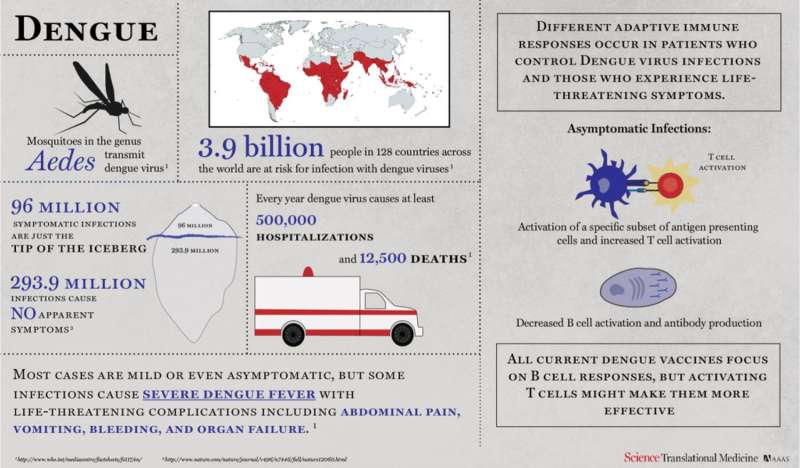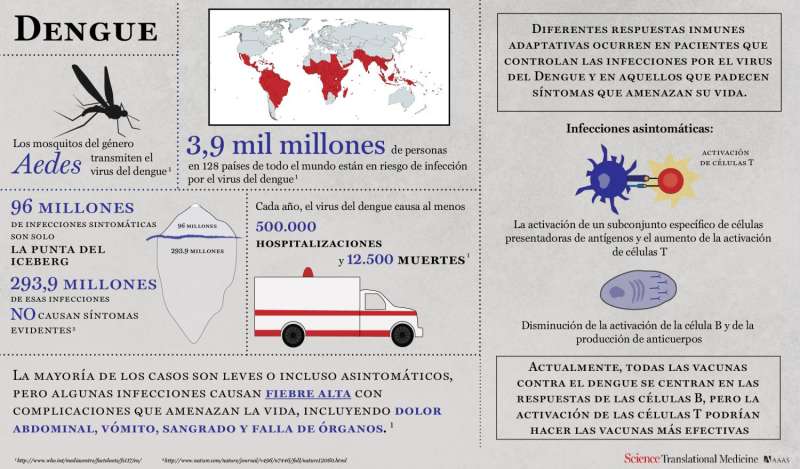Infographic explaining global burden of dengue virus infection and new findings with implications for vaccine development. Credit: Carla Schaffer / E. Simon-Loriere et al. / AAAS
(Phys.org)—A large team of researchers from France and Cambodia has identified gene expression patterns and immune signatures associated with dengue fever symptoms in people who demonstrate an immune response. In their paper published in the journal Science Translational Medicine, the group describes obtaining blood samples from children in Cambodia infected with the dengue virus and finding differences between those who showed symptoms and those who did not.
Dengue fever is an infection caused by the dengue virus. Prior research has found that most people who are infected have a mild response or no response at all. Unfortunately, some develop very serious infections that result in hospitalization or death. Scientists have been searching for a reason for the different responses, but until now, have found few answers—this is mainly due to the fact that people without symptoms do not seek help that would result in their blood being tested. In this new effort, the researchers overcame that problem by asking parents in Cambodia to bring their children in for blood tests whether they were sick or not. The team was able to collect blood samples from 85 local children and found that nine of them had contracted the virus but showed no symptoms, and another 25 had also contracted the virus and were showing symptoms.
To better understand why some of the children were able to withstand an infection with no apparent problems while others became very sick, the researchers looked for immune response signals in the blood of both. They also conducted a genetic analysis looking for differences in gene expression regarding an immune response.
Infografía que explica la infección por el virus del dengue en el mundo y nuevos hallazgos con implicaciones para el desarrollo de la vacuna. Credit: Carla Schaffer / E. Simon-Loriere et al. / AAAS
The researchers report that they found those children with a stronger response had lower expression from genes that were part of the process involved in antigen presentation, which is part of the process of activating T cells. They also had lower expression from genes that were involved in apoptosis and increased expression from genes involved in the maturation of B cells, which produce antibodies.
The team concluded that children who develop symptoms typically exhibit diminished expression from genes that contribute to apoptosis, which contributes to the generation of plasma cells, which in turn produce low-affinity antibodies.
More information: Etienne Simon-Lorière et al. Increased adaptive immune responses and proper feedback regulation protect against clinical dengue, Science Translational Medicine (2017). DOI: 10.1126/scitranslmed.aal5088
Abstract
Clinical symptoms of dengue virus (DENV) infection, the most prevalent arthropod-borne viral disease, range from classical mild dengue fever to severe, life-threatening dengue shock syndrome. However, most DENV infections cause few or no symptoms. Asymptomatic DENV-infected patients provide a unique opportunity to decipher the host immune responses leading to virus elimination without negative impact on an individual's health. We used an integrated approach of transcriptional profiling and immunological analysis to compare a Cambodian population of strictly asymptomatic viremic individuals with clinical dengue patients. Whereas inflammatory pathways and innate immune response pathways were similar between asymptomatic individuals and clinical dengue patients, expression of proteins related to antigen presentation and subsequent T cell and B cell activation pathways was differentially regulated, independent of viral load and previous DENV infection history. Feedback mechanisms controlled the immune response in asymptomatic viremic individuals, as demonstrated by increased activation of T cell apoptosis–related pathways and FcγRIIB (Fcγ receptor IIB) signaling associated with decreased anti-DENV–specific antibody concentrations. Together, our data illustrate that symptom-free DENV infection in children is associated with increased activation of the adaptive immune compartment and proper control mechanisms, leading to elimination of viral infection without excessive immune activation, with implications for novel vaccine development strategies.
Journal information: Science Translational Medicine
© 2017 Phys.org
























